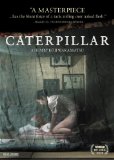| Reviews & Columns |
|
Reviews DVD TV on DVD Blu-ray 4K UHD International DVDs In Theaters Reviews by Studio Video Games Features Collector Series DVDs Easter Egg Database Interviews DVD Talk Radio Feature Articles Columns Anime Talk DVD Savant Horror DVDs The M.O.D. Squad Art House HD Talk Silent DVD
|
DVD Talk Forum |
|
|
| Resources |
|
DVD Price Search Customer Service #'s RCE Info Links |
|
Columns
|
|
|
Caterpillar
You've no doubt heard this before - Koji Wakamatsu's Caterpillar is a film that is much easier to respect than to enjoy. Based on a short story by Edogawa Rampo that was banned prior to publication, Wakamatsu, who got his start in the mid 1960's with the ever-popular soft-core "pink films," presents Caterpillar as a damning critique of the jingoism and militarism that defined mid-twentieth century Japan. It's an unsubtle film that is prone to on-the-nose metaphors and plunges into hysterics, but also a powerful, and depressing indictment of those who glorify warfare and posit wounds as honors afforded to the bravest soldiers.
Lieutenant Kurokawa (Keigo Kasuya), shown in an opening scene raping and killing an unnamed Chinese woman, returns to his prototypical village a limbless torso, deaf and half his face covered with burn scars. The man is glorified as a War God, his "sacrifice" a badge of glory and three actual medals pinned to his chest. With the veteran unable to do much outside of squirm, sleep, and eat, Kurokawa's wife Shigeko (Shinobu Terajima) is entrusted with her husband's care. Kurokawa's relatives retreat quickly, with only his brother, unfit for service due to his health, dropping by occasionally with earnest but hollow words of encouragement.
After going to pieces as anyone would, Shigeko quickly learns that despite his disabilities, her husband's sex drive is very much in order - the activity, which Wakamatsu renders without much eroticism, takes a disturbing turn when the formerly battered woman (in a flashback we see Kurokawa curse her for supposedly infertility) understands that her husband's limitations can be exploited. Shigeko smoldering anger at Kurokawa's condition and social pressure to take care of the war hero push the woman to punish her immobile husband.
Kasuya, reduced to grimacing and leaving his mouth open for stretches of the film, is handed a difficult task of humanizing a man who has been stripped of expression and mobility. His success in doing so testifies to the actor's strengths, especially in later portions of the film when Kurokawa is haunted by his actions - unable to vocalize his terrors, the torso trashes with fear in a particularly difficult to watch scene. Shigeko, the central voice of the film, is terrific, her demeanor like a permanently open wound that refuses to heal. The way the actress transitions between fits of anger and guilt at abusing her man is impossible to look away from.
The film's shortcomings fall squarely into Wakamatsu's court - at eighty-four minutes, the film feels twenty minutes too long. The director makes his points awfully clear and has an unfortunate habit of returning to the same images until the effect is numbing. He cuts back time and time again to a mantle that houses a picture of the emperor, Kurokawa's medals and a newspaper article honoring the soldier - a potent gathering of metaphors that deserves a look, but not a dozen. Also overwhelming and unnecessary is the documentary footage book-ending the film while facts of casualties stream across the screen. While the mostly female village community thrives on propaganda, running drills and singing a variety of patriotic songs on a daily basis, Wakamatsu shows this routine enough times so that real footage, when it appears, feels intrusive and obvious. The director may desire to place this story within a specific time period, but it works more powerfully as a sharp criticism of all warfare.
Caterpillar is a difficult film to sit through but a lingering work that may not be worth revisiting but should raise some stimulating discussion and perhaps force some difficult questions about how we view our veterans and wars.
The DVD:
Video:
A widescreen 1.85:1 transfer marred by compression artifacts, with blown out outdoor scenes looking especially bad. The film was clearly shot on a low budget (IMDB lists it at $120,000) but the outdoor scenes are inexcusable, especially coupled with tinted subtitles that make it impossible to read the dialogue. This occurs several times in the film, so be prepared to squint.
Sound:
A Stereo 2.0 track is included, and the main menu does not list sound/subtitle options, so you have to look on the back of the box to confirm it. It's a fine mix, especially since the film relies more on dialogue than a musical score. Not especially immersive but not distracting. Extras: A short Lorber bio and two trailers, one for Wakamatsu's 2007 film United Red Army and another for the Romanian drama Tuesday, After Christmas. The lack of any valuable extras is especially disappointing in light of the prosthetics used to render Kasuya limbless and a desire to hear more from the actor, who spends the movie largely mute. Final Thoughts: Caterpillar comes Recommended based largely on the film's strengths, which despite succumbing to the director's penchant for making the subtle obvious, still leaves an emotionally raw work that demands at least a single viewing.
The best of the five boroughs is now represented. Brooklyn in the house! I'm a hardworking film writer, blogger, boyfriend and hopeful Corgi owner. Find me on Twitter @markzhur and on Tumblr at Our Elaborate Plans...
|
| Popular Reviews |
| Sponsored Links |
|
|
| Sponsored Links |
|
|
| Release List | Reviews | Shop | Newsletter | Forum | DVD Giveaways | Blu-Ray | Advertise |
|
Copyright 2024 DVDTalk.com All Rights Reserved. Legal Info, Privacy Policy, Terms of Use,
Manage Preferences,
Your Privacy Choices | |||||||













